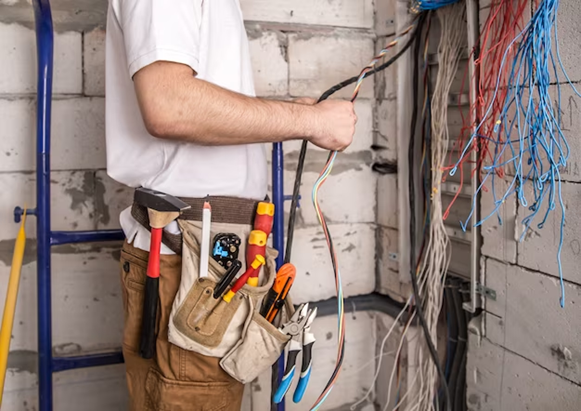Electrical Program
This program is designed to provide students with the knowledge and skills required to work as electrical technicians in a wide range of settings. Throughout the program, students will also receive training in soft skills such as communication, teamwork, and safety procedures. The curriculum will be regularly updated to keep up with evolving electrical technology and industry standards. Graduates of this program will be prepared for careers as electrical technicians in a variety of settings, from residential to industrial applications.
Residential electrical courses are limited to the residences in which usually there are no more than four living units within the same house and includes work to connect and work within accessory structures. The maintenance and installation of electrical systems in residential houses. This sector consists of living quarters for private households. Common uses of electricity associated with the use of electricity in heating, water heating, air conditioning, lighting, refrigeration, cooking, and running a variety of other appliances.
PHILLY-TECH’S commercial electrical courses concern the businesses and commercial buildings. The difference between residential and commercial use of electricity is that residential electricians usually typically deal with single-phase systems ranging between 120V-240V. Commercial electricity is three-phase or more, where the conductors carry anywhere from 120V to 480V due to high commercial electrical load power use.
The industrial courses cover the generation, transmission, distribution and sale of electric power to the general public and industry. The wiring done by commercial electricians remains exposed; however, it is typically run along the exposed sides of ceilings and walls in factories, chemical plants, and mines. It also included the power lines, distribution stations, network control.

Diploma in Electrical Technician
Duration: 1 to 2 years (4 to 8 Trimesters).
Prerequisites:
ELECSY 100: Introduction to Electrical Systems
- Overview of electrical systems and their applications
- Basic electrical terminology and safety procedures
- Historical development of electrical systems
ELECCIR 100: Electrical Circuits
- Fundamental electrical circuits and principles
- Ohm’s law and basic circuit analysis
- Voltage, current, and resistance
ELECTEQ 100: Tools and Equipment
- Introduction to electrical tools and equipment
- Proper tool usage and safety
- Basic tool identification and selection
ELECCOM 100: Electrical Components
- Identification and application of electrical components
- Wiring methods and materials
- Safety procedures for electrical work
RWIRIN 100: Residential Wiring and Installation
- Wiring systems in residential settings
- Installation of receptacles, switches, and fixtures
- Electrical codes and regulations for residential wiring
RWIRTR 100: Residential Electrical Troubleshooting
- Diagnosing and repairing common residential electrical problems
- Use of electrical testing and measuring equipment
- Safety precautions in residential electrical work
RELECS 100: Residential Electrical Services
- Electrical service panels and breakers
- Service entrance and grounding
- Electrical service upgrades and maintenance
RELECS 100: Residential Electrical Safety
- Residential electrical safety standards
- Fire and shock hazards in residential electrical work
- Safety measures for electrical technicians
CELECW 100: Commercial Electrical Wiring
- Wiring systems in commercial buildings
- Installation of electrical distribution systems
- Commercial electrical codes and regulations
CELECTR 100: Commercial Electrical Systems Troubleshooting
- Diagnosing and repairing common commercial electrical problems
- Electrical testing and measurement in commercial settings
- Three-phase power systems
LIGHTS 100: Lighting Systems
- Commercial lighting fixtures and controls
- Energy-efficient lighting and control systems
- Emergency lighting and exit signs
CELECS 100: Commercial Electrical Safety
- Safety considerations in commercial electrical work
- Lockout/tagout procedures
- Compliance with commercial electrical codes and regulations
IELECS 100: Industrial Electrical Systems
- Electrical systems in industrial settings
- Control systems and automation
- Motors and motor control systems
IELECTR 100: Industrial Electrical Troubleshooting
- Diagnosing and repairing common industrial electrical issues
- Programmable logic controllers (PLCs)
- Industrial control panel wiring
HIVS 100: High Voltage Systems
- High-voltage electrical systems
- Substations and transformers
- High-voltage safety measures
IELECTES 100: Practical Training and Final Assessment
- Hands-on experience in residential, commercial, and industrial electrical work
- Final assessment and evaluation of practical skills
Successful completion of the program leads to the award of the Diploma in Electrical Technician
Students have to contact the school administration if they want to take extra credits or transfer credits to pursue the Diploma Certificate or Associate of Applied Science (A.A.S.) Degree in their field of interest. Students will select required number courses in each of the areas listed to meet general education requirements graduation for the A.A.S. Some of these courses can be transferred directly from and to the university system and may be substituted for recommended courses on the outline. Students should speak with an advisor before doing so these selective courses are required for all students.
- Selected Communication Course (Choose two for Diploma or three for the Associate)
ENGL 100: Fundamentals of Speech
CPL 100: Career Planning
CPL 101: Communications and Career Strategies
ENGL 101: Composition
ENGL 102: composition
- Selected Mathematics Course (Choose two for Diploma or three for the Associate)
MATH 100:General Math
MATH 101:Intermediate Algebra
MATH 102:College Algebra
- Selected Social Science Course (Choose two for Diploma or four for the Associate)
ECON 105:Leadership
ECON 101:Principles of Microeconomics I
ECON 102:Principles of Macroeconomics II
SOC 101:Introduction to Sociology
PSYC 101: Introduction to Psychology
HIST 101: History
